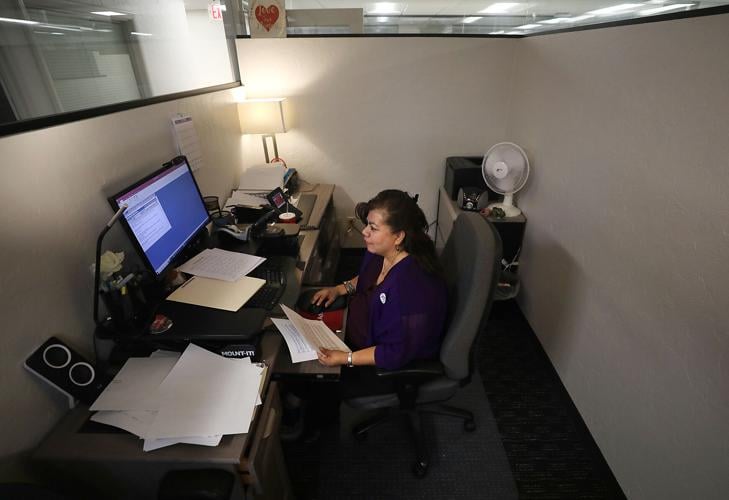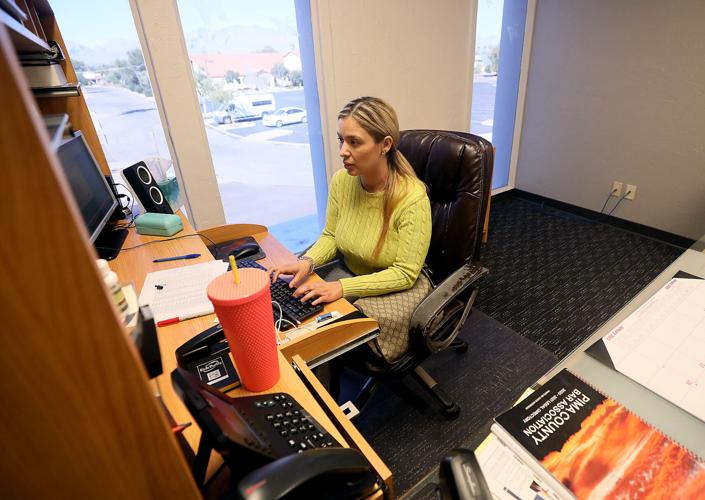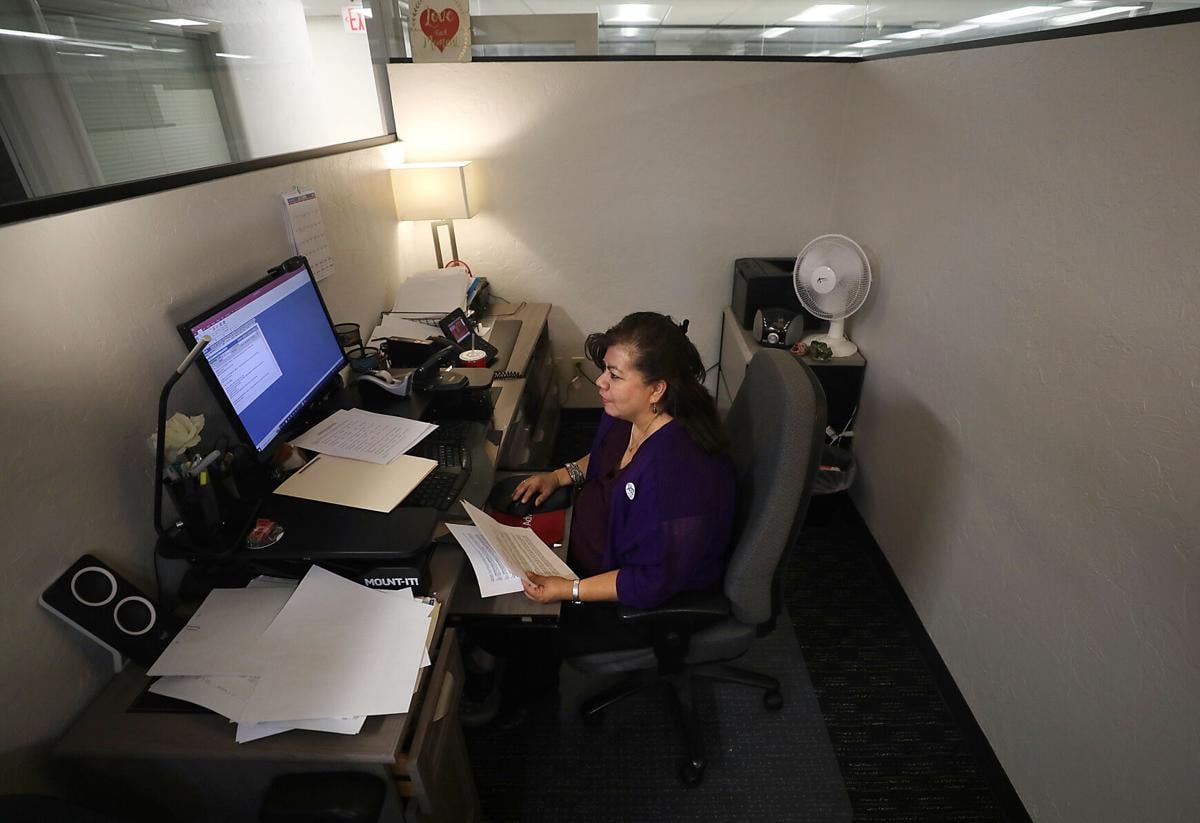Survivors of domestic violence said in a recent University of Arizona study that safe housing and legal support are the greatest needs when trying to leave an abusive situation.
And despite a lack of funding, resources and staff, local service providers are working hard to fill those needs.
Emerge Center Against Domestic Abuse, a local nonprofit that assists victims and their loved ones, has seen a 21% increase in calls to its 24/7 hotline over the past two years. In addition to the more than 8,000 calls coming into the hotline — the most in a single year — the number of people seeking Emerge’s services and programs has also increased 18% from last year.

With an intake waitlist of 60 people and reports of domestic abuse returning to pre-pandemic levels, Emerge CEO Ed Sakwa said the organization is stretched thin trying to keep up with the immediate need for its services.
Also, as housing prices rise and many landlords are unwilling to take vouchers as the demand for housing outweighs the supply, finding short- and long-term housing options has become a major struggle, he said.
Southern Arizona Legal Aid is also feeling the strain as staffers work to keep up with a heavy caseload of immigration and family law cases involving abuse survivors. With providers across the country competing for the same small pot of federal funds each year, finding enough money to hire lawyers and support staff has never been an easy task, according to officials.
But providers say they’re focused on listening to survivors and putting their efforts toward the services they say they need.
Prioritizing safety
In March, the UA’s Southwest Institute for Research on Women published its Pima County Domestic Violence Community Needs Assessment, which surveyed 47 domestic violence survivors and nine service providers about existing services and unmet needs. The study was conducted at the request of the Pima County Domestic Abuse Coalition, an organization of community service providers, government and law enforcement agencies that are working to improve the landscape for survivors.
Survey responses indicated that while most survivors were aware of some local services, almost all needed help accessing them, and many found that services were unavailable to them because of capacity issues.
Based on the feedback from survivors and service providers, researchers determined the greatest immediate needs are increased capacity and scope of services, most notably legal and housing assistance.
The report also recommended the coalition develop a training program that “standardizes a collective operating framework,” saying that when only certain agencies operate from a survivor-centered approach, the whole system is negatively impacted.
“Prioritizing survivor safety is paramount in an overtaxed system,” the report said, adding that the use of a lethality assessment program will help triage survivors for the services they most need.
In December 2017, the state Supreme Court adopted the Arizona Intimate Partner Risk Assessment Instrument System as the standardized form presented to judges during defendants’ initial appearances after a domestic violence arrest. The mandate went into effect in April 2018 and was implemented by all seven law enforcement agencies in Southern Arizona.
The assessment asks questions about physical violence in the relationship; the defendant’s access to guns and substance use habits; if jealously or controlling behaviors are present in the relationship; and if the defendant has ever strangled or choked the victim.
Between July 1, 2021, and June 30, 2022, Emerge received 1,539 referrals from law enforcement related to APRAIS risk assessment screens conducted on-scene while responding to domestic violence-related calls to 911. Emerge served 569 people from that group of survivors.
During that period, 77% of all APRAIS screenings had a score that indicated the survivors were at elevated or high risk of being killed, up from 73% the previous year and 71% the year before that.
Lives at risk
The Southern Arizona Center Against Sexual Assault staffs forensic examiners who have received specialty training to conduct strangulation exams, which are available regardless of if the victim has been sexually assaulted. However, there is no designated funding for strangulation exams related to domestic violence without sexual assault, said SACASA director Katlyn Monje.
“Forensic strangulation exams are not covered by insurance, and payment by the county for these forensic exams is not mandated by the government for domestic violence victims,” Monje said. “Without funding for strangulation exams, the lives of victims are at risk.”
Forensic strangulation exams can identify symptoms and prevent serious injury, while also providing valuable evidence that can be used in legal proceedings. Monje said that a lack of strangulation exam creates an evidentiary gap that can let violent offenders escape felony convictions.
One in four women experience intimate partner violence in their lifetime and as many as 68% of them will experience near-fatal strangulation by their partner. The odds of a woman being killed by her partner increase 750% if she has been previously strangled by that person, according to the Training Institute on Strangulation Prevention.
In late 2019, the now-Domestic Abuse Coalition was given $50,000 in grant money to fund 100 strangulation exams authorized by law enforcement. After that money ran out, the coalition was able to allocate $15,000 from a Tohono O’odham Nation grant to fund another 30 exams. Since December 2019, SACASA nurse examiners have performed 126 strangulation exams.
There is funding available for only five more such exams, Monje said.
SACASA is seeking additional funding sources, she said, but with an average of three strangulation exams provided each month, the organization is in critical need of funding to continue to provide the service.
Some members of the coalition have been exploring the idea of creating a family advocacy center that would serve as a one-stop service hub for victims of interpersonal violence, but the group is split in terms of support for the project. Some members believe that because there isn’t enough funding and capacity to support survivors from their respective locations, it’s too soon to bring all the providers together in one space.
In addition, survivors surveyed by the UA did not indicate that co-location of services was currently among their greatest needs.
While the idea of a one-stop hub of services for victims of interpersonal crime is good in theory, Sakwa said, it’s not realistic given the current conditions. And the notion that a victim would only have to share their story once isn’t true, given that each provider collects different pieces of information, he said.
“We can think about the future, but sometimes we do need to address things here and now to save lives today,” Sakwa said. “It’s not just about the short and long term, but rather what victims have asked for.”

Mercedes Camacho, a paralegal, sits in on a legal meeting with attorneys and a client at the Southern Arizona Legal Aid office.
‘Rent is through the roof’
Emerge received an average of 22 calls a day to its emergency, multilingual hotline, between July 1, 2021, and June 30, 2022. More than 2,000 people received support through Emerge’s community-based, nonresidential services.
Nearly 300 adults and children benefited from its emergency shelter services, but time of stay has increased dramatically from pre-pandemic days, with the average length of stay increasing from 28 to 71 days. Finding safe and affordable housing for survivors and their children has become increasingly difficult between the pandemic and current economic conditions, Sakwa said.
Since July 2020, all people needing Emerge’s emergency shelter services have been sent to a temporary, undisclosed location. The temporary plan is safe, but it has been difficult to operate a shelter out of someone else’s business, and the option is not the most cost-efficient.
Plans for a new multi-million-dollar expanded shelter are in the works but still more than a year away, Sakwa said.
“Rent is through the roof, and landlords are not taking vouchers like Section 8, so the need for housing is huge right now,” he said.
With expected cuts to federal funding that will mean hundreds of thousands of dollars less for Emerge, Sakwa and others are concerned about what that will mean for capacity, given that there already isn’t enough to meet the current need.
“When you’re talking about an issue where people’s lives are on the line and there’s a major shift in funding, it doesn’t just impact Emerge. It impacts every victim service provider in the community,” Sakwa said. “There has to be some prioritization here.”
More lawyers needed
For organizations like Southern Arizona Legal Aid, funding is also the biggest barrier to increasing the capacity to help more survivors, said Deputy Director Jamie Ibrahim.
“(We don’t) receive any state or local funding,” Ibrahim said, adding that SALA relies entirely on grants, donations and limited to federal funds to operate.
Family law and immigration cases involving domestic violence and sexual assault survivors make up the majority of the group’s legal services. In 2021, SALA handled 2,000 family law cases.
“Exactly the type of assistance that survivors were saying they need in (the UA report), we’re doing that,” said Kristin Fitzharris, who heads up SALA’s Tucson Domestic Relations & Immigration unit. “We just don’t have the capacity to do as much as we want and as much as the community needs.”
Nearly 25% of SALA’s family law and immigration cases are handled by pro bono lawyers, as part of the organization’s volunteer program. But hiring one more domestic relations specialist lawyer would mean SALA could help 30 to 42 more survivors, Fitzharris said.
SALA covers nine counties and 11 tribal nations. It used to have three immigration lawyers and two support staffers, but after two of those lawyers retired, there’s only one immigration attorney to handle all the cases.
“I could just use any more lawyers that I can get,” she said. “That would make a measurable impact for the community.”
In addition to a lack of attorneys, a post-pandemic slowdown in the courts has affected SALA’s ability to take on new clients. While family law cases are already typically a lengthy process, they’re now taking even longer to resolve, Fitzharris said.
“The need (for our services) has been pretty consistent,” Fitzharris said. “If you look at crime in the United States, it’s been falling since the 1990s, but domestic violence and domestic violence-related homicide and crimes are not falling at the same rate.”
Many survivors don’t report to police and aren’t interested in criminal prosecution but still need help with custody issues or with crime-based immigration petitions, Fitzharris said.
“Prosecutors say they’re overwhelmed with domestic violence crimes, but there is a huge percentage of people who aren’t reporting and have good reasons for that,” she said. “If that’s not in best interest of the survivor for whatever reason … we’re there to help them.”
Historically underfunded
Legal and other services for survivors of gender-based violence have been historically underfunded, said Negar Katirai, a UA clinical professor of law.
The federal Violence Against Women Act was signed into law in 1994 to create and support comprehensive, cost-effective responses to domestic violence, sexual assault, dating violence and stalking.
From the start, only 32% of VAWA funds were allocated toward social services for survivors, with the other 68% going toward the criminal legal system, Katirai said.
By 2013, only 15% of the money was earmarked for social services.
Katirai runs a clinic at the UA where students represent victims of intimate partner violence. Each semester, she has between five and 10 students who assist local survivors with legal needs including orders of protection, custody, child support, landlord/tenant, public benefits and immigration issues.
“Many providers are at capacity, and we’ve done our utmost to get funding,” she said. “Everyone who is a funder in this space needs to think about where we’re allocating their funds and how they’re balancing it when it comes to all the different things we know we need.”
Katirai’s students also do policy work and community outreach, including advocacy work on behalf or survivors and presentations about healthy relationships and knowing one’s rights.
Katirai said they’re working to make the landscape better for survivors. They had some recent success in changing a procedural rule for how orders of protection can be litigated in court. Previously, a person could not talk about things if they were not included in the original petition, which posed a problem, as many survivors didn’t know they had to write everything down, Katirai said.
Now, they’re able to convey additional information through a written or verbal statement to the judge.
Kaitrai said if society would think of domestic violence as a public health problem and invest in preventative services like housing, case management and legal services, it would help victims make a decision to leave before the situation escalates and the lethality risk increases.
“It’s easier to view as a couple bad actors, but it’s bigger than that,” she said.
Talking about healthy concepts of gender norms and consent at an early age is key, she said, as is investing in bystander training.
“You have a role as a neighbor, as a friend. You can be part of the solution in that context, and you don’t have to be a hero,” she said. “There are subtle things you can do just by being supportive in a nonjudgmental way. That right there is huge.”







